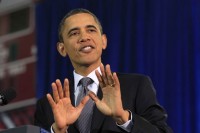Is the “Do-Nothing Congress” Responsible for Job Growth?
In recent speeches President Obama has complained about the “Do-Nothing Congress” and stated this as a reason why he should get re-elected. He also has been talking about increased job growth and taking credit for this because it has occurred during his administration. But what if the increased job growth is a result of the Do-Nothing Congress and nothing to do with his administration?
Two reasons for job decline in previous years can be directly tied to an activist Congress. First, the housing bubble was created as a result of government intervention in the housing market by guaranteeing loans to unqualified buyers. This encouraged corruption in the mortgage industry because the lenders were protected in the case of loan failures, and they could make more money by creating bad loans. When this housing bubble burst, large unemployment, initially in the construction business, but later in secondary markets was the result. Hence, job decline can be directly tied to a “Do-the-wrong-thing Congress.”
Secondly, “Obamacare” has incentivized corporations to hire fewer people because of the financial uncertainty, and likely increased burden, it places on employers. This creates a higher incentive for employers to work with as few full-time employees as possible, and encourages part-time jobs and contract labor instead. This also was the result of an activist Congress, passing legislation designed by special interests that did not have overwhelming support from the society as a whole.
This past session, the gridlock has caused the government to operate a bit more like the founders intended. James Madison wrote about how the system they designed was intended to produce gridlock unless the entire country was solidly behind something. And indeed, the recent law aimed at reducing the insider trading by members of Congress after both Nancy Pelosi and John Boehner were caught doing it and exposed on CBS 60-Minutes was overwhelmingly passed. This occurred when the entire society was overwhelmingly behind it. It shows that the Congress can still act in the public interest when public consciousness is sufficiently raised. This is as the founders intended.
Thus, I would argue that there is a very good possibility that job growth is directly the result of the failure of the last Congress to either pass new spending programs or enact government economic guarantees that would cause more bubbles. Hence, President Obama got it backwards. This “Do-Nothing Congress” turned out to be a better thing than the Congress that it followed. No, this doesn’t mean that there isn’t a lot more corruption that a “Do-Something” Congress couldn’t clean up, but in this case the “Do-Nothing” Congress was basically a sign that special interests didn’t exercise as much control over the Congress, manipulating it to get something for themselves and place more burdens on American economy.



Do nothing; do something and do the wrong thing, are catchy descriptions that would apply to how Congress has acted recently. The first description of , do nothing would reflect how little actions have been taken to curtail , too big to fail banking. Next in line, is the legislation on some kind of national health reform as an example of , do something. Finally, the administration experts in foreign policy have taken the State Department down the path of , do the wrong thing. It should be clear to everyone by now, the investment banking and the mortgage lending industries acted unethically for decades while government oversight commissions turned a blind eye to the wrongs. And, the government continues the same risky practice of underwriting or insuring loans. $500 million dollars of Solyndra Energy debt will likely fall on the government as the insurer of their loans; and, ultimately the cost will be shouldered by the US taxpayer. This is a continuation of too big to fail practices by the President. The same kind of government insurance guarantees remain in place for many big banks. Little has been done to stop this kind of policy. Furthermore, the Federal Reserve continues to shore up European banks with $trillions of dollars in loans.
There is much heated debate over Res. Obama’s healthcare plans. Intertwined in the healthcare debate is the looming bankruptcy of the Social Security retirement system. Economist have characterized the Social Security plan as a ponzi scheme on the verge of collapse. It seems the government’s solution to the insolvency of social security and the future cost of national healthcare plans is to have the Treasury … print more money.
If there was a lesson to learned from the Iraq War then it would be … don’t do the wrong thing. But, a majority of voters would say that the invasion and 9 year occupation of Iraq was not in the best interests of the country. The US foreign policy is confused. The security of Europe must be the responsibility of European powers. The US ought not be the primary force behind the security of the Mediterranean Sea. Nonetheless, the US security pact with Israel would remain unchanged. At the same time the US must turn its attention to the security of the Far East.